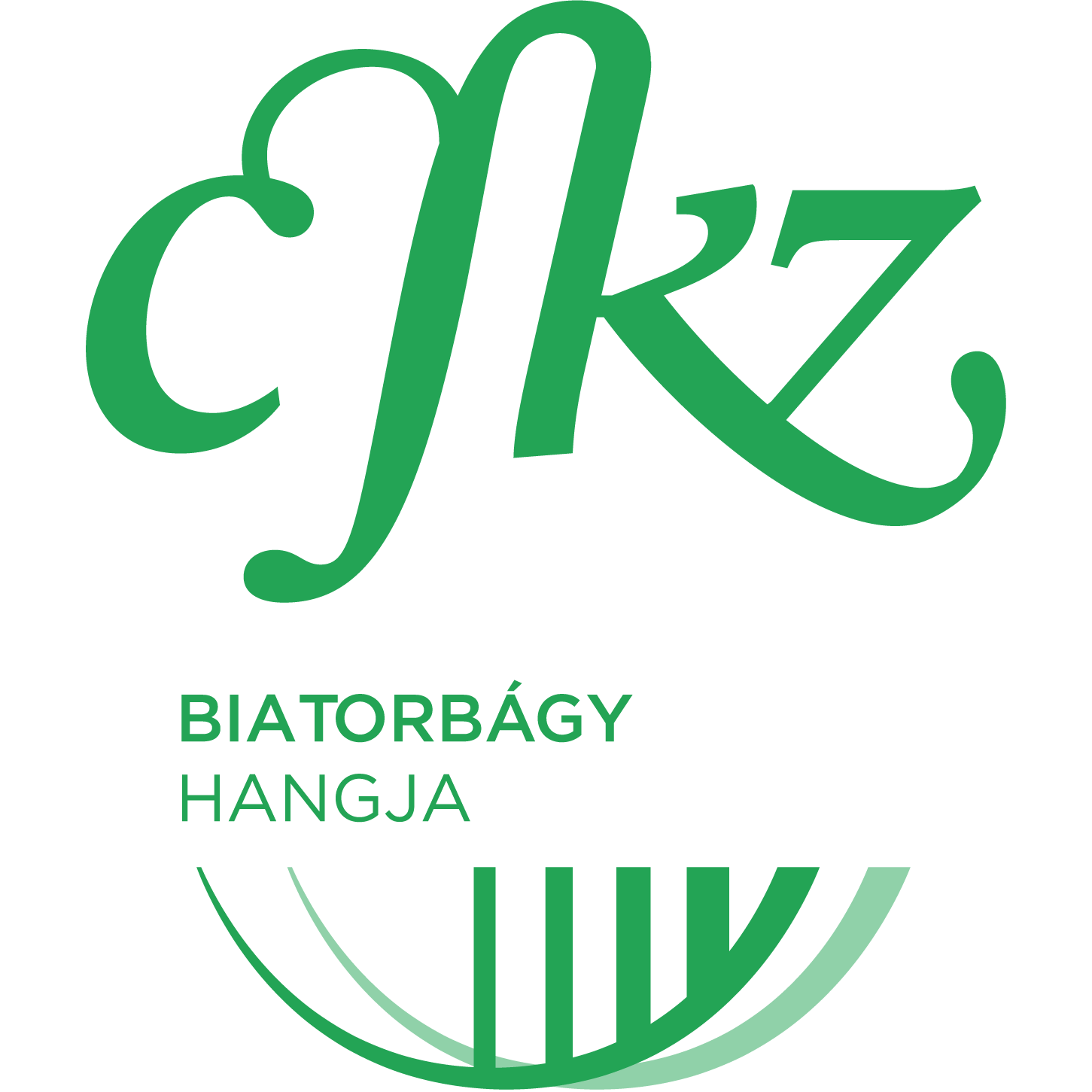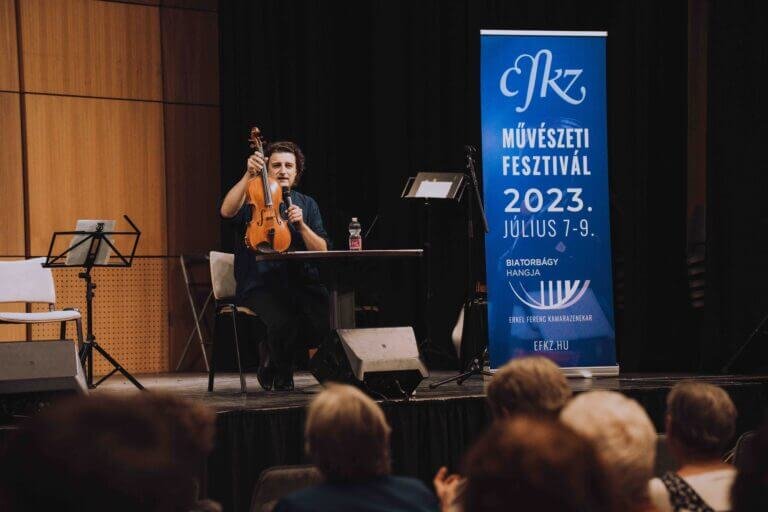EFKZ Art Festival 2023
We would like to express our gratitude to the Municipality of Biatorbágy for their support,
the selfless assistance of JFMK,
the creative approach of Völgyhíd TV,
the kindness of our venue hosts,
the enthusiasm of the audience,
and the high-quality performances of all the participants!
This year, our program was dedicated to the memory of Petőfi at the Biatorbágy Festival. At each event, poems were recited by young talents from Biatorbágy! Below, under the “Detailed Program” section, you’ll find a retrospective instead of an introduction. For more photos, visit our Facebook page.
The organizers of the EFKZ Art Festival:
 András Bolyki Festival Director, and Eszter Lesták Bedő Artistic Director
András Bolyki Festival Director, and Eszter Lesták Bedő Artistic Director
The Detailed Program
July 7th, Friday

(ANGOL) A Fesztivál és a kiállítások megnyitója
17:00
JFMK
A Művészeti Fesztivál megnyitó ünnepségét érdekes performansz zárta.

(ANGOL) Barokk zenei koncert
19:30
Biatorbágy, Szent Anna templom
Az EFKZ barokk zenei koncertje virtuóz énekes, hegedűs és trombitás szólistákkal.
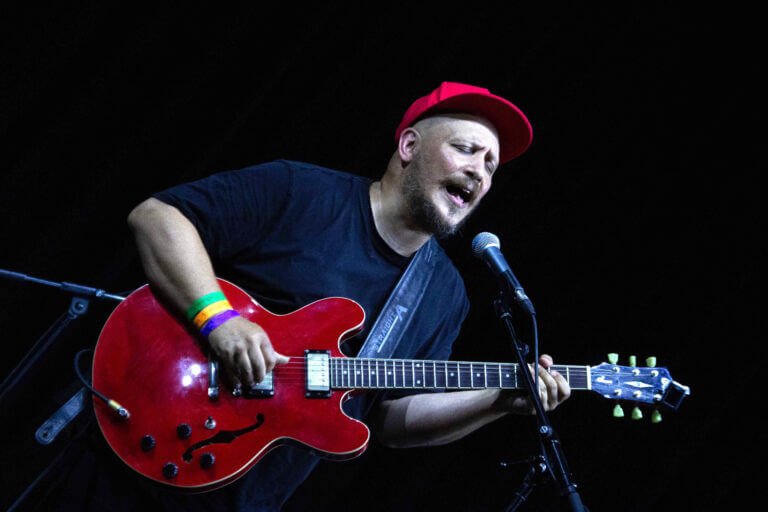
(ANGOL) Jazz session
21:00
JFMK Nagyterem
Éles Gábor blues gitáros és meghívott barátai koncertje
July 8th, Saturday

(ANGOL) Zenélő Mese
11:00
JFMK Nagyterem
Erika Illési nagy sikerű zenés mese műsora (nem csak) gyerekeknek.
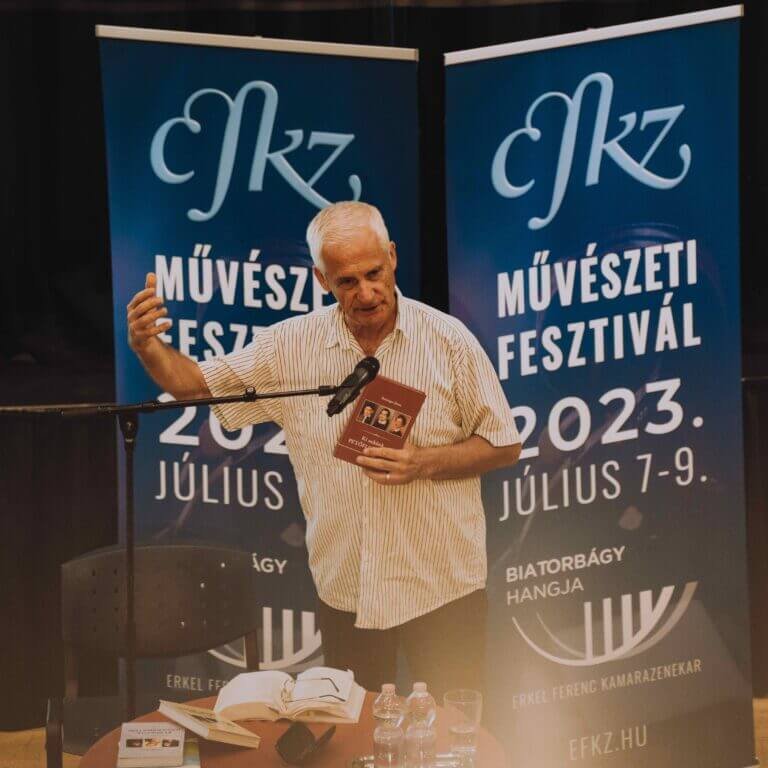
(ANGOL) Irodalmi est
17:00
JFMK Nagyterem
Távolból – Petőfi dalairól
Dr. Reisinger János előadása, közreműködik a Barcarola Kvartett

(ANGOL) EFKZ Nagykoncert
19:30
JFMK Nagyterem
Bolyki A., R. Strauss és Hidas Frigyes művei
km.: Lakatos György -fagott
July 9th, Sunday
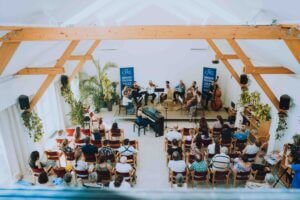
(ANGOL) Utánpótlás koncert
17:00
A Testvérgyülekezet imaháza, Lomb utca 2.
A PMAMI növendékeit kíséri az EFKZ
They wrote about the 2022 I. EFKZ Art Festival:
Local patriot global stars in Biatorbágy?????
About a festival that has never been before
Just two years after Iván Fischer and Zoltán Kocsis founded one of the world’s top ten orchestras, the Budapest Festival Orchestra, in 1985, enthusiastic students from the Béla Bartók Secondary School of Music came together for chamber music playing under the name Erkel Ferenc Chamber Orchestra.
At that time, these talented youngsters had no idea that many of them would play together in one of the world’s best orchestras, nor did they imagine that someday the EFKZ (Erkel Ferenc Chamber Orchestra) would organize an artistic festival in the town of Biatorbágy. In the same place where the four brothers formed the sensational a cappella group Bolyki Brothers that started its world-conquering journey around 1984. Notably, one of them, László Bolyki, is also a member of the Festival Orchestra, a composer, a spiritual counselor-preacher, and the author of several books on spirituality. The renowned musician Bolyki family and Bedő Eszter Lesták, a violinist and the concertmaster of EFKZ, joined their decades-long musical and friendly relationship. And as you might have guessed, over time, all of them moved to the charming suburban town of Biatorbágy. To the place where the former train station building, extended with a beautifully fitting new part, houses culture, and the cultural center bears the name of Juhász Ferenc, the poet born in Biatorbágy, a two-time Kossuth Prize winner. This became the central venue for the first EFKZ artistic festival. Well, also for the entire town: its famous pastry shops, beautiful squares, unique bookstores, and historic church. The festival’s program was full of curiosities, with excellent musicians, an extremely energetic concertmaster, and the festival director, András Bolyki, bringing forth novelty through their enthusiasm, perseverance, and creativity. All of this was unified by the sometimes overt, sometimes palpably felt spirituality, which provided a life-shaping force for most participants. Faith in the Almighty, local patriotism, high professional quality, and noble humility were present in every production. They could be observed in the opening performance, in the duet by Petra Várallyay and Sára Bolyki, in the expressive works of young, acclaimed sculptors Réka Gergely and Tamás Gilly, and in the concert photos by Márton Bolyki. They were evident in the baroque concert, the ecumenical musical devotion for peace, the junior concert by PMAMI students, László Bolyki’s spontaneous “Soul Service,” the first joint concert of EFKZ and Gábor Farkas, a Liszt Prize-winning pianist, the fantastic and unique Blue Rabbit plus EFKZ production, as well as in the performances of György Lakatos, a Liszt Prize-winning bassoonist, and many other EFKZ masters, in the children’s program or in the evening of Gábor Éles, a great jazz singer-guitarist, and his young musician friends. Even Béla Fesztbaun’s theater performance titled “Happy Sad Song,” which won the Jászai Mari Award, didn’t lack this “Biatorbágy, EFKZ” atmosphere.
The mostly Biatorbágy audience quickly formed a community at each event. Gastronomy was not missing either, in true EFKZ fashion, with a refined elegance. Katalin Paulay, a violinist, prepared the EFKZ slice according to her own recipe, available at local pastry shops and prepared by entrepreneurial housewives for concertgoers.
In addition to the cooperation between locals and musicians, the exemplary financial support of the Biatorbágy Municipality made the festival possible. The reception leaves no doubt that there is a need for continuation. Another EFKZ artistic festival is expected in Biatorbágy in the summer of 2023! In the meantime, it’s worth attending EFKZ concerts across the country and tasting the EFKZ slice at pastry shops in Biatorbágy and Páty!
-SZKM-
The EFKZ Art Festival was a music-cultural “spring” for me. As an individual, a communal being, and a music therapist, I thoroughly enjoyed almost every moment (since I couldn’t be present every minute). From the Saint Anne Church to the closing concert, the Festival encompassed a wide range of life’s qualities.
The synergy of arts, spirituality, gastronomic culture, the desire for peace… interwoven with musical framework and content of high quality, shaped my days. Its inspiring effect is still present in me today. As a psychologist, I know that it was beneficial for both individuals and the community, creating a new form of cohesion and instilling a sense of “art enthusiast” identity.
As the founding president of the Hungarian Music Therapy Association, I congratulate you; I experienced the moments given and conveyed by music with pride.
Dr. Ildikó Konta
Clinical Psychologist, Certified Music Therapist
On the Margin of the EFKZ Art Festival
It’s never easy to expect the audience to engage in such an intensive program for three consecutive days. Especially when we are organizing an art festival in Biatorbágy for the first time. Moreover, in the middle of summer, with a thematic focus that demands attention.
So, how was it? Super! Smiling faces everywhere! Filled with love!
It was proven that even serious musicians aren’t always serious. Classical music can be entertaining. A festival can accommodate depth and emotions.
Last weekend, we held Biatorbágy’s first EFKZ Art Festival, featuring classical music concerts, church singing and playing, literature, visual and photographic exhibitions, spiritual programs, and a party! The students of the Pászti Art School performed, the artists of the Erkel Chamber Orchestra played, the world-renowned pianist Gábor Farkas gave a performance, Gábor Éles and his friends played music, and the Blue Rabbit soul band performed.
The orchestra, the school’s teachers, the cultural center staff, a multitude of technicians, marketers, and many others worked together for the success.
Everyone put in their maximum effort and knowledge to ensure that those who attended would hear light-hearted yet high-quality music.
During the week leading up to the festival, intensive, full-day rehearsals not only shaped the musical repertoire but also strengthened the connections among the organizers, allowing us to almost anticipate each other’s thoughts and present the programs to the audience seamlessly.
And the audience became our partners!
They were present at every venue, applause resounded, and at the end of each concert, everyone went home enchanted, under the influence of the experiences: both the audience and the musicians. Because I can speak for many: we put in a lot of work and energy, but we received at least as much in return.
That’s why it’s worth doing!
Thanks for the idea and the tremendous effort invested in organizing go to Eszter Lesták-Bedő, the concertmaster of EFKZ, and András Bolyki, the director of the festival.
Thanks to everyone who stepped onto the stage.
It was a pleasure to support their work and provide a space for such a fantastic event. Thanks to those working behind the scenes who ensured that everything sounded great, and high-quality recordings were made, which those who couldn’t be present can also watch.
The fact that we ourselves enjoyed the festival so much is well indicated by the fact that we are already thinking about next year’s repetition.
But until then, we warmly invite everyone to EFKZ concerts at the Juhász Ferenc Cultural Center!
Melinda Fülöp Deputy Director of JFMK
On the Margins of the EFKZ Art Festival
Not long ago, we were wondering whether the Erkel Chamber Orchestra, also known by its abbreviation and nickname EFKZ, could be “the voice of Biatorbágy.” Because it matters whether a small town has a voice, and if it does, what kind of voice it is. Soft, loud, harmonious, or dissonant?
Many of us wanted it, many of us wished for it: and suddenly, it happened—the EFKZ became “the Voice of Biatorbágy.” And their first festival showed us what this voice sounds like.
Even during the preparation period, you could see and feel the professionalism in everything, from the venues and design to the accompanying programs and the musical offerings.
Those three days were a real journey through the world of music literature, from the Baroque to contemporary music, from Vivaldi’s melodies echoing in the Saint Anne Church—classical harmonies—to exciting musical experiments, reaching its peak with the joyful jam session with the Blue Rabbit band on the main stage of the Community Center. But the festival went beyond the walls, taking to the streets and squares, with impromptu concerts by the orchestra members creating a special atmosphere throughout the town.
The festival was both locally meaningful and globally significant. The audience in Biatorbágy was joined by more and more curious visitors, witnessing the presence of many great musicians and vocalists from Biatorbágy itself, who showcased their talent and knowledge alongside the world-renowned EFKZ.
The festival also placed a special emphasis on children. Not only were there music-filled fairy tales and matinees for them, but they also had their own concert where the young musicians of Biatorbágy – the PMAMI students – played alongside the orchestra. It was not only an unforgettable experience for them but also for their family members.
The background programs were infused with a deep respect for art within families, while also honoring the talents and strengths of individuals. Amid the musical programs, exhibitions by sculptor duo Réka Gergely and Tamás Gilly, Márton Bolyki’s photography exhibition, László Bolyki’s “Soul Service,” Béla Fesztbaum’s literary evening, and Katalin Paulay’s EFKZ-inspired slice at the pastry shops provided moments for reflection and admiration, allowing the audience to discover harmonies resonating in words, flavors, and souls.
Like a drop in the ocean, the festival embraced a wide and colorful spectrum not only in the realm of music literature and styles but also in its supplementary events – for all ages, whether participants or spectators, listeners. High-quality music permeated the town, promising and delivering new experiences day after day, visibly sparking growing interest.
Eszter Lesták-Bedő, the concertmaster of the orchestra and the musical director of the festival, and András Bolyki, the director of the festival, tirelessly organized and led the event from start to finish, even playing music themselves—drawing energy from who knows where.
Applause erupted when they announced that they are ready for the second EFKZ festival next year.
Until then, memories remain: many still watch the recordings and reports from Völgyhíd TV, recalling what the first EFKZ festival was like, and how, as the first, it was exceptionally special.
Erzsébet Turi Völgyhíd TV
